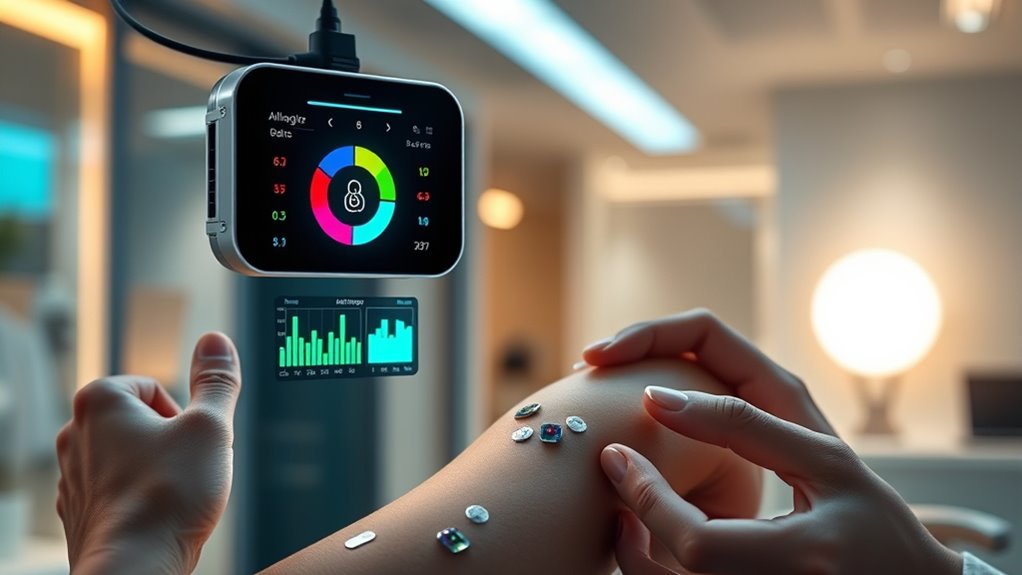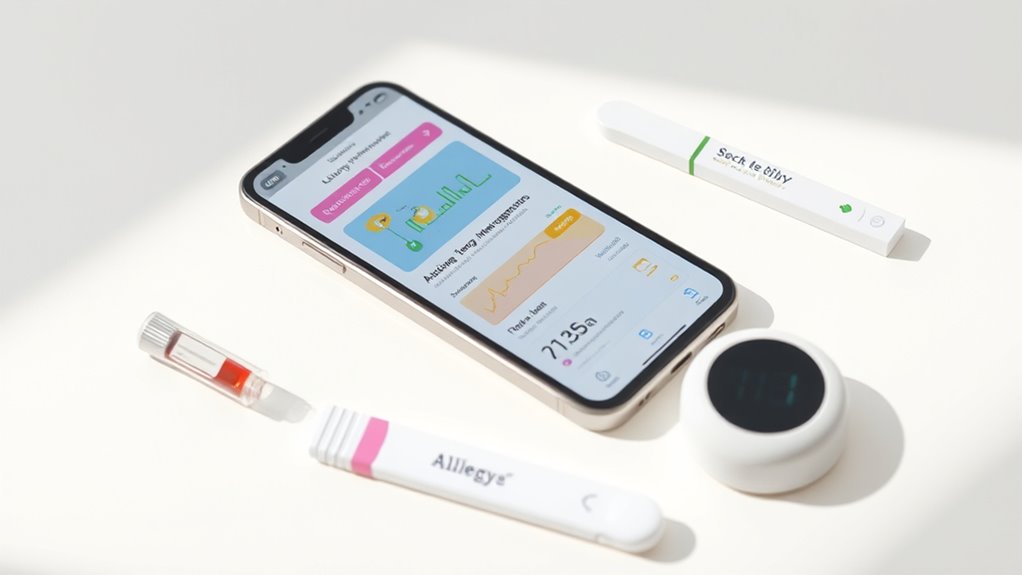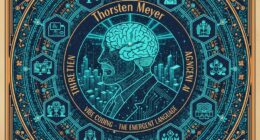AI helps you manage allergies better by analyzing your health history, environmental factors, and even genetic data to create personalized treatment plans. It predicts flare-ups and provides real-time insights, so you can stay ahead of symptoms. Using wearable devices and apps, AI offers proactive strategies tailored to your unique needs. If you’re interested in how this technology is shaping the future of allergy care, there’s more to discover ahead.
Key Takeaways
- AI analyzes extensive health, environmental, and genetic data to create tailored allergy treatment strategies.
- Machine learning models predict individual allergy flare-ups using real-time symptom and environmental data.
- Personalized management plans are developed by integrating genetic information and personal health history.
- AI-powered wearable devices and apps enable proactive, real-time allergy monitoring and symptom prediction.
- Continuous data collection and analysis refine treatment approaches, improving quality of life and allergy control.

Have you ever wondered how artificial intelligence is transforming allergy management? AI has become a game-changer in healthcare, especially when it comes to handling large datasets and complex variables. This makes it particularly suitable for allergy research and treatment. By analyzing vast amounts of symptom data, pollen levels, and individual health information, AI can uncover patterns that were previously difficult to detect. This allows for more accurate predictions of allergy flare-ups and helps tailor management strategies to each person’s unique situation.
AI analyzes symptom data and pollen levels to predict allergies and personalize treatment strategies.
In allergology, AI isn’t just used for broad research—it’s actively applied to conditions like asthma, atopic dermatitis, and rhinology. One of the key advantages is personalization. Instead of one-size-fits-all treatments, AI enables healthcare providers to create forecasts and management plans based on your personal characteristics. It considers factors like your genetic makeup, environmental exposures, and specific symptoms to develop a customized approach. This means that your treatment is more targeted, increasing the chances of effectively controlling symptoms and improving your quality of life.
To make these predictions precise, AI algorithms are trained on extensive symptom data and pollen counts, constantly refining their accuracy. They learn from patterns in your health history and environmental factors, providing real-time insights that adapt as your condition evolves. These advancements are complemented by the integration of genetic data, which adds another layer of personalization, allowing for even more accurate diagnoses and tailored treatment plans. The goal is to catch allergic reactions early and adjust treatments proactively, reducing the severity of symptoms and preventing complications. Incorporating real-time data collection enhances the responsiveness of these systems, enabling quicker interventions. Additionally, understanding the individual variability in allergic responses emphasizes the importance of personalized approaches to allergy management.
Moreover, advances in AI-powered allergy prediction are helping to democratize access to personalized care by offering tools that can be used outside of clinical settings. As these technologies develop, they are increasingly leveraging machine learning techniques to improve accuracy and adapt to new data inputs. Ensuring the accuracy of AI models is crucial as it directly impacts patient outcomes and trust in these systems. However, deploying AI in allergy management isn’t without challenges. Ethical considerations such as data privacy and security are critical. Your health data must be protected, and transparency about how your information is used is essential. There’s also a risk of over-reliance on technology, which can potentially overshadow clinical judgment. Ensuring the accuracy of AI models is vital; unreliable predictions could lead to improper treatment. That’s why ongoing validation and ethical frameworks are necessary to guide responsible AI development and use.
Looking ahead, AI promises to enhance your care by enabling more personalized management and earlier detection of allergic conditions. Wearable devices and apps, like the SoundHealth SONU app, are already using AI to predict symptoms and suggest treatments in real time. As technology advances, your allergy management will become increasingly precise, proactive, and tailored to your individual needs—making it easier to breathe easier and live healthier.
Frequently Asked Questions
How Accurate Are AI Allergy Predictions Compared to Traditional Methods?
You might wonder how AI predictions compare to traditional allergy diagnosis. AI tools have shown higher accuracy, reaching up to 92%, versus traditional methods at around 85%. They also offer better sensitivity and specificity, meaning fewer false negatives and positives. By analyzing large datasets quickly and accurately, AI enables more precise diagnosis and personalized treatment plans, ultimately improving patient outcomes compared to manual, traditional approaches.
Can AI Adapt to Changes in a Patient’s Allergy Profile Over Time?
You ask if AI can adapt to changes in your allergy profile over time. Yes, it can. AI continuously analyzes new data from your health records, wearable devices, and environmental sources. It updates predictions and treatment plans accordingly, considering factors like genetic changes or environmental shifts. This ongoing learning helps guarantee your allergy management stays personalized and effective, adjusting to your evolving health needs without delay.
What Are the Privacy Concerns With Ai-Powered Allergy Data?
You should be aware that AI-powered allergy data raises significant privacy concerns. Your sensitive health information must be protected through strict regulations like GDPR and HIPAA. Ensuring data security with encryption and access controls is essential, but risks like data breaches and bias remain. Transparency, patient consent, and ethical handling are vital to maintain trust and prevent unauthorized use or misuse of your personal allergy data.
How Accessible Is AI Allergy Management for Underserved Populations?
Did you know that AI tools are making allergy management more accessible to underserved populations? You can now use multilingual mobile apps or tele-allergists to screen symptoms and get guidance without needing expensive visits. These innovations reduce healthcare disparities, reaching those in remote or low-income areas. AI democratizes care by providing affordable, real-time support and environmental monitoring, helping everyone manage allergies more effectively, wherever they are.
What Are the Limitations of AI in Diagnosing Complex Allergy Cases?
You’re asking about AI’s limitations in diagnosing complex allergy cases. AI models often struggle with data quality and bias, which can lead to inaccurate predictions. They may lack robustness, interpretability, and clinical validation, making their diagnoses less reliable. Additionally, integration into healthcare systems is challenging due to infrastructure needs, data privacy concerns, and the need for extensive training. These factors can hinder AI’s effectiveness in managing complex allergy diagnoses.
Conclusion
With AI guiding your allergy management, you’re like a captain steering through stormy seas with a trusted compass. It personalizes your treatment plan, predicts flare-ups, and helps you avoid triggers, turning a formidable journey into a smoother sail. Embrace this technology as your ally, and watch your quality of life blossom like a well-tended garden. Together, you and AI can transform allergy challenges into manageable milestones, making each day brighter and more comfortable.










